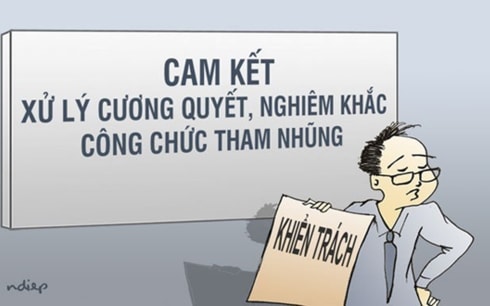As long as there are "bad" officials, people's dissatisfaction is still there.
Where does the corruption of officials come from if not from lax, lenient and indulgent management of officials?
During the meetings with voters of Party and State leaders after the 6th session of the 14th National Assembly, the issue that voters were most concerned about and asked the most questions about was the negative situation of corruption.
The sharing and answers were given with high political determination. How can officials truly be "of the people"; not take advantage of the people, take advantage of the law to harass and abuse power; how can there be no more "moles" that cause discomfort in social life. To do so, the prerequisite is to change the sense of power of a part of officials. Because people cannot stop being upset when there are "bad" officials.
|
| To deal with "petty" corruption, the core is still people, and it is the responsibility of a group of cadres and civil servants. |
It is worth mentioning that Ho Chi Minh City is not the only locality. It seems to have become a common reality, a common frustration of society. It is difficult to list all the acts of harassment and bribery of a large number of grassroots officials because people and businesses have had to approach and do procedures in health care, education, real estate, real estate registration, etc.
Without the so-called bribery fee, things would not go smoothly, and it would be impossible to know when it would be finished, or one would have to run back and forth many times to meet the "sky-high" demands of the officials performing public duties. This form of torture has changed in many ways. People are tired, businesses complain, but it is normal, it has become a habit of the representatives of public agencies and people, whether they like it or not, even if they are annoyed, they have to accept it. It is condemned by the whole society and named "petty corruption". It makes the head of the Government impatient when he said that he would have to organize a national conference on fighting "petty" corruption. It makes the head of the Party and State worried because it "spoils" officials.
Many reasons have been pointed out, leading to the situation of "petty" corruption creeping into the nooks and crannies of social life and openly existing. For example, the poor quality of the institutional system, legal regulations with many unclear and complicated administrative procedures. For example, the psychology of concern, fear of causing difficulties, wanting to get things done quickly, to get things done by businesses and people. For example, state management agencies and law enforcement agencies only focus on major corruption cases, not attaching importance to handling "petty" corruption.
Everyone understands that small acts have big consequences. But whatever the cause or reason, the root cause and decision are still human. No matter how unified the system is or how strict the laws are, if the executors want to circumvent them or take advantage of them to bully and harass, businesses and people have no choice but to bribe, give envelopes, and pay bribes.
Therefore, according to the World Bank (WB), Vietnam ranked 109th out of 137 economies in terms of unofficial payments and bribes. In 2017, nearly 60% of businesses had to pay unofficial fees, some even had to pay more than 10% of their revenue. People's envelopes range from a few hundred thousand dong to millions of dong, corresponding to the amount of money they ask for and give. Who do those unofficial fees go to, who do they enrich, if not the officials who are enforcing the law?
Where does the corruption of cadres originate from if not from lax, lenient, and indulgent cadre management, if not from greed, from a distorted sense of power of a group of cadres who claim to be "servants" of the people but "eat" from the people "from nothing"?
Therefore, to prevent "petty" corruption from being a haunting "mole" that is very annoying in social life, from being a factor causing public discontent, losing people's trust, and corrupting officials, in addition to perfecting institutions, changing mechanisms, reforming administrative procedures, and making fields of operation transparent, the core is still changing the attitudes and behaviors of state agencies and officials in performing public duties.
People create material wealth for the development of society and the maintenance of the state apparatus. They have the right to demand that officials and civil servants must be responsible for performing their duties, serving the people, serving the country, and setting an example in respecting the law. Only such officials can stand firm against the temptation of money, build people's trust in justice, and bring peace to the people, without causing them any trouble./.


